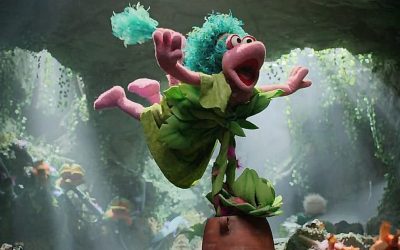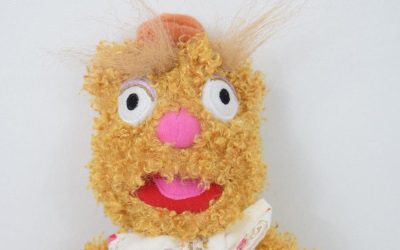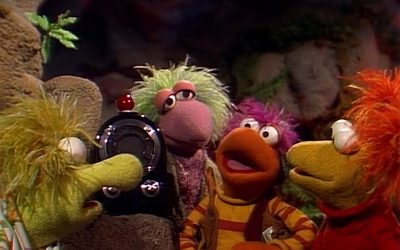Did you see the first part of our interview with Muppeteer Jerry Nelson? Click here to bask in its glory! Or, y’know, just read it.
Because Jerry has performed so many characters on so many different programs, the next two parts of our interview will be in “lightning round” style. For the most part, we’ll shout out characters and production names, and we’ll see if we get a “Polo” to our “Marco”.
ToughPigs: Let’s start with The Muppet Show. When you started filming, did you have any idea that The Muppet Show was going to be as big as it was?
Jerry Nelson: No. We hoped it would be. I think we did in a way after the first few, because the first season was a smash in England. It wasn’t in the states, I don’t know why. I think the second season was when the people in the US started zeroing in on it. By that time, Lew Grade was happy and Jim was happy, so it went from there.
TP: You were the go-to guy for the ancillary characters. Did you prefer that to having more signature characters of your own?
JN: There was a lot going on in my life at that time, and I wasn’t always a happy camper. So I’m not sure. I think at the time, I thought they weren’t giving me enough to do. But when I go back and look at it, aside from a few early episodes that I wasn’t in at all, I can see that I did a fair amount of work. And there’s something nice about being the utility batter.
TP: Thankfully you’ve got such a great range of voices, no two characters sound the same.
JN: I’ll give you a little secret. All of the characters I did were just bad impressions of my favorite character actors from movies and radio. They’re just bad imitations, so bad that nobody noticed what I was doing (laughs).
Emily Bear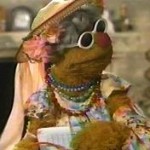
TP: Fozzie’s mom seemed like she was being built up to be a more visible character in the late 80s, early 90s. Do you think she was meant to stick around?
JN: I don’t know. I think because [Muppet Family Christmas] was a family thing, and Fozzie was kind of unconnected. Kermit had his nephew Robin, and Fozzie as a character didn’t really have that connection.
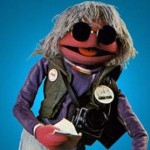 Fleet Scribbler
Fleet Scribbler
JN: Another one who didn’t last too long. I guess that was a tip of the hat to British journalists. I’m not sure why he didn’t work. That’s not the way I am, so that’s not coming from anywhere inside me, and I don’t know if that’s a reason for it not to work. Maybe I just didn’t have a good take on that kind of aggressive behavior.
Floyd Pepper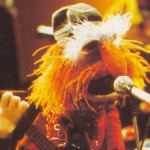
JN: I felt very close with Floyd. Mostly because of the music. I liked the idea of this hip commentator about Miss Piggy or the music. But that part was not me, I loved the music on the show, all of it was really great. I could just relate to that, and it’s how I’d like to see myself.
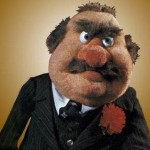 J.P. Grosse
J.P. Grosse
JN: I think when they needed to put pressure on doing the show in the theater, they added that device to create tension.
TP: What we’ve heard from most people is that he became a much less interesting character once we actually saw him.
JN: I don’t know, I liked the grossness of him. I appreciated that.
Jerry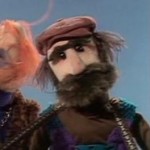
TP: You played the puppet version of yourself in the Country Trio.
JN: That was from before The Muppet Show, that was when we were on The Dick Cavett Show. Jim loved to sing, as did we all. Frank has hesitations about that, but he really brought something to the songs that were totally his own and comedic in a way that only Frank can do. But those were fun characters for us to do, the whole idea of us appearing with those characters.
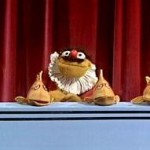 Lew Zealand
Lew Zealand
JN: I think Lew was my tribute to Frankie Fontaine. He had that dopey voice, but he could sing beautifully. We never did that part of it on the show, but just the idea of this guy who had a boomerang fish act. There were some really ridiculous acts on the show, and that was one of the all-time dopey ones.
TP: What was it about Lew Zealand that kept him around, as opposed to any of the other one-shot characters?
JN: I think they just loved the voice. And the fact that he was just so into throwing these fish. It was pretty silly, and it was fun to do. He didn’t feel like a one-joke character to me, so I just played it for all it was worth.
Louis Kazagger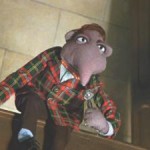
JN: Ah, The Wild World of Muppet Sports. The Muppet Show was a stage show, but there were TV takeoffs like Veterinarian’s Hospital and Pigs in Space and the Newsman. Louis Kazagger was a part of that, and a way to do some really silly sports bits. He was kind of a nod to Howard Cosell.
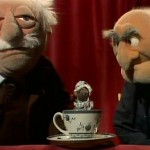 Miss Mousey
Miss Mousey
JN: “Don’t Sugar Me” was, I think, the first thing we did with her. I don’t remember if she was ever meant to be a principal character.
TP: You don’t think she was built to be a rival to Miss Piggy?
JN: No, I don’t think so. That would’ve been later when Annie Sue came along. But Miss Mousey was just.. a mouse who would sing funny little songs. Jim loved those types of songs.
Pops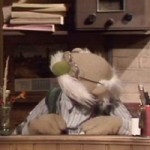
JN: Pops was fun. Jim liked to change things around on the show to keep it new. And he liked to change the look of the show, slightly. So Scooter got other duties and they wanted someone else to introduce the guest stars. I don’t know where the idea for the character came from, but he was a wonderful character, and I always had fun playing him. He was kind of cantankerous and hard of hearing. Some type casting going on maybe (laughs).
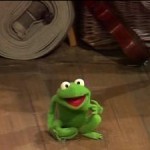 Robin
Robin
JN: Robin, Kermit’s nephew, was a young frog who just always felt that he wasn’t big enough or wasn’t doing enough, and he wanted to break it big time, and he had ideas that were kind of grandiose for a young frog. That’s pretty much who he was. If you listen really carefully, you’ll find that between Robin the Frog, Emmet Otter, and Gobo, there’s not a whole lot of difference. Gobo’s a little older and a little more Canadian, which is my tip of the hat to our Canadian brothers. Robin was typically more in the front of the mouth, while Gobo was more in the whole mouth, and Emmet Otter was more in the back. That’s sort of the fun of doing voices too, where you place the voice. For something small, you make it small and put it in a small place. If it’s big, you put it in a bigger place.
When people ask me how to study characters, I say study everything. Study nature, study the way birds are and look and walk and feed, study the way people act and laugh, everything in life is what you’re portraying as a puppeteer, as a performer, as someone who does characters. You’re looking at all the variables in life, all the things that make people what they are. And you make selections and choices based on what the characters thinks about himself and who the character is and the spine of what the characters are doing. It all fits together, but you have to study everything. Nothing can be left out.
Dr. Strangepork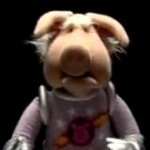
JN: He was so much fun, he was such a character. I loved doing that silly accent. It was fun because he could be in cahoots with anybody or against anybody. He could be working with Piggy against Link or with Link against Piggy, it didn’t matter. It was all interesting and science to him.
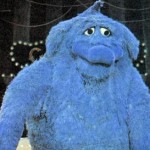 Thog
Thog
JN: The most enjoyable Thog experience I had was when we were in Las Vegas doing the Nancy Sinatra show. Working with Nancy with Thog singing a song, and working with Mia Farrow in the Valentine’s special, those are the times that stand out in my mind. When I think of Thog in terms of The Great Santa Claus Switch, I only think misery, because we were stuck in those things for so long. At that time, there was nothing except a rubber rainboot with no real shoe inside, so there was no support. I think Frank got flat-footed after doing that character, and he never did another large character after that. It was hard, and we were in there for long periods of time. In The Frog Prince, I was in the Sweetums costume. Richard wasn’t with us when we did that.
TP: And that wasn’t you performing the voice, right?
JN: Right, that was [Canadian actor Carl Banas‘] voice. The series of shows we did up there, those were all shows we did with CBC, and they needed to have a certain percentage of Canadian content, so they used Canadian actors. Normally we’d prefer to do the puppets and the voices at the same time, and we did do a few of the characters, but we had to have a certain percentage of Canadian actors.
Uncle Deadly
JN: Ah, the Phantom of the Muppet Show. I loved the puppet, that lizardy creature. The voice I used for that was my take on John Carradine. That kind of Shakespearian dramatic actor. He was the Phantom of the Muppet Show, so I figured he had an acting background. I always loved John, I always loved his voice. Years ago, I used to go to a bar in the theater district, and I’d sometimes stop by and have a beer. And I found myself sitting next to John Carradine one afternoon, and he regaled me with stories. I always loved him anyway, and after that I just thought he was the best. It always surprises me, occasionally something of his will come on Turner Classic Movies, and I’ll see him in a role I’ve never seen before. It’s always like a bright sunshiny day when that happens.
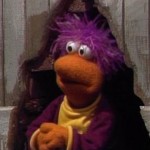 TP: Let’s change gears and talk about Fraggle Rock. What was it like taking a more front-and-center role than you have in previous productions?
TP: Let’s change gears and talk about Fraggle Rock. What was it like taking a more front-and-center role than you have in previous productions?
JN: I didn’t think of it as a front-and-center role. Gobo was the coherent one that kept things a little focused, because Wembley wembled, Boober was fixated on things going bad, Mokey was very airy, and the real competition was Red who was very competitive with Gobo and tried to be sort of a scout leader. But obviously, he had his own ghosts and foibles to deal with, as do we all. And I think that even though he was a strong leader, he was also vulnerable. That’s something that’s very telling about the human condition, even the strongest people have moments of weakness.
TP: And that’s what I think makes Fraggle Rock the most interesting, that the characters all have flaws that coincide with their strengths.
JN: And the other thing is that they do not see the larger world that they live in, and how it’s all interdependent until the very end. But throughout the rest of us, they’re either adversaries like the Gorgs or they’re inexplicable and just there like the Doozers. In the new Sesame book, there’s a picture of “Around the Corner” with all the puppeteers, and there’s a quote by Fran Brill that I’ll paraphrase. We were there, all jumbled on the floor with the puppets, and she looked around and saw people of all races and all ilk and creed and beliefs, both the puppeteers and the people working, and she thought, “All of these people getting along joyously, this is what the world should be like. This is what’s missing in the world.” Such a beautiful thing. It is what’s missing.
Marjory the Trash Heap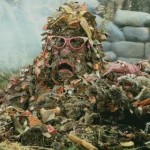
JN: Marjory started out as my salute to Maria Ouspenskaya. I always loved her in films. I was sort of doing that, and it occasionally slipped into the Jewish grandmother. In fact, they got letters about that saying, “How could you do this? My grandson thinks the Trash Heap talks like his grandmother.” It is kind of funny, but it was certainly never meant to offend anyone. And it was not relegating Jewish grandmothers to trash, that was never the intention. She was a personality that people looked up to, that’s the aspect I would have preferred they focus on, that she’s wise and knowledegable, even though the things she says doesn’t make a lot of sense.
TP: How exactly did she work?
JN: She was a big foam rubber thing with stuff pasted all over her. I would raise up this two-by-four to lift the head and slip it into place, and then the mouth would speak and the eyes worked, and there were two puppeteers doing the hands. So it took three people to perform her. She was great fun, and I loved singing with her.
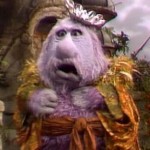 Pa Gorg
Pa Gorg
JN: Pa was very blustery and full of himself. I guess the most telling thing was, “I’m not scared of anything. Woah, what was that?!?”
TP: What was it like performing a character while someone else is controlling the action?
JN: It took some work on both [Gordon Robertson’s] part and my part. I had very definite ideas on who the character was and how he should behave. Gordy is a very talented performer, puppeteer, mime. He would interpret what I told him and turn it into a movement that worked. It didn’t take long. Rob [Mills] and Richard [Hunt] clicked like that [when performing Junior Gorg]. And once we had it, it just grew from there.
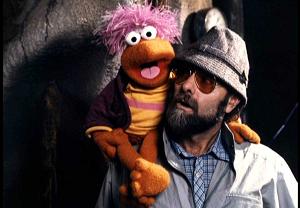 Click here for part three of our chat with Jerry Nelson, in which Jerry talks Sesame Street, Saturday Night Live, Muppet Christmas Carol, and more!
Click here for part three of our chat with Jerry Nelson, in which Jerry talks Sesame Street, Saturday Night Live, Muppet Christmas Carol, and more!
Click here to compare Jewish grandmothers to trash on the ToughPigs forum!
by Joe Hennes – joe.toughpigs@gmail.com

